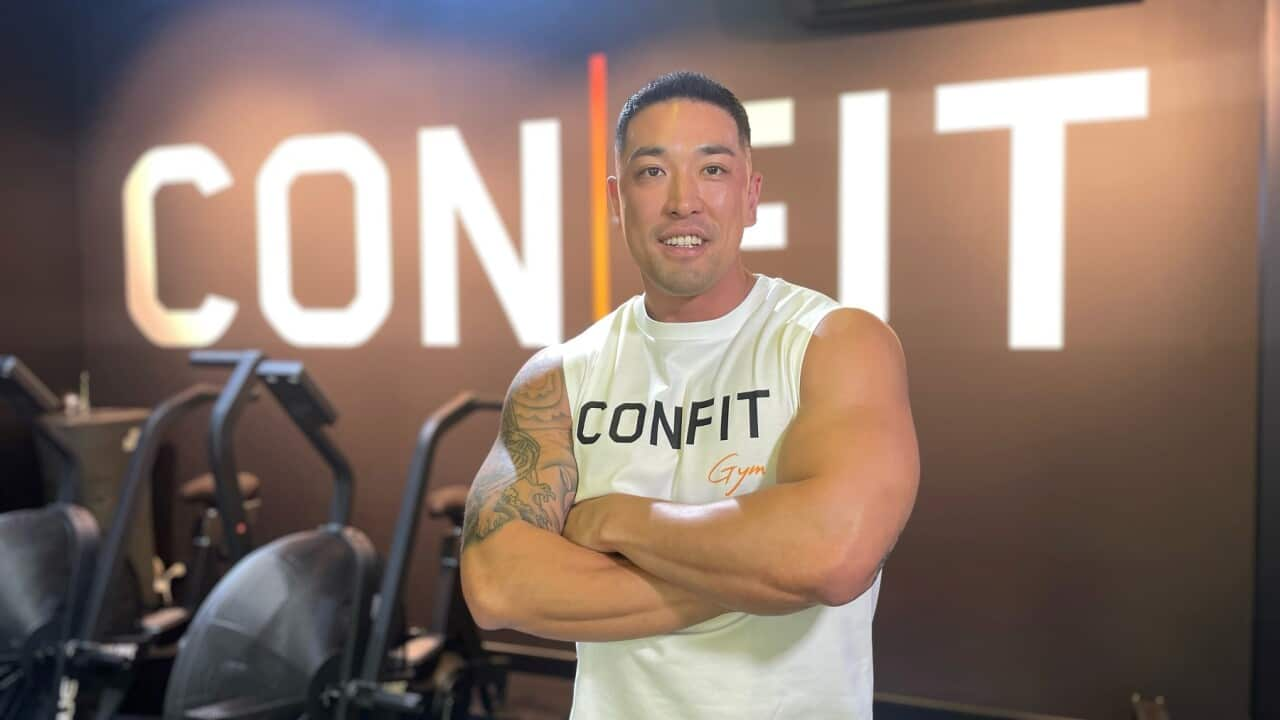TRANSCRIPT
Trainers at Confit Gym in Parramatta, in Sydney's west, are putting the final touches on their new facility.
The gym's motto goes beyond simply pumping iron and getting fit.
“All our trainers have had that lived experience, they've all hit rock bottom, but they've used fitness to transform their lives around. It's a story of redemption. You can't help people who don't want to change - but for those who do want a second chance, we should give it to them as a society. “
That is Joe Kwon.
He explains he spent most of his 20s locked up in prisons across New South Wales.
“I grew up in a very marginalised community, a lot of violence. There was a huge gang culture. But at a young age, I ended up going to prison. I spent nine years behind bars. When I got out I realised it was very hard to get community support.”
After his release, he set up a not-for-profit social enterprise, Confit Pathways, that provides mentorship for troubled youth in detention and newly released prisoners, through fitness.
Now, he's putting the finishing touches on Confit Gym, where all sales here will be redirected to fund the not-for-profit.
His aim is for the gym is to become a self-sufficient financial model to continue his programs across the state, while breaking the negative stereotypes of former prisoners.
“There's so many inmates training everyday, it's part of their living, it becomes purpose to them, to wake up everyday, to train. So why don't we get them skilled up and get them to become qualified fitness trainers so they can have employment on the outside?”
28-year-old fitness coach Danielle Hogan did just that.
A decade-long cycle of drug addiction and domestic violence led her to 17 months in prison.
She connected with Confit a week after her release seven months ago, and says it's changed her view on life.
“From the minute you're arrested there's labels on labels on labels that are continuously placed on you - and you actually start to believe them, which is the saddest part. It took a really long time to realise I am worthy of more and so this is why being at Confit, I know I am fulfilling that worth.”
Having work colleagues live through a similar troubled past to her - while simultaneously working on their own journey to self-improvement - has provided her with a sense of workplace comfort she says she couldn't find anywhere else.
“For the last 10 years I was stuck in this loop of addiction, domestic violence, I honestly just forgot the person I was, the amazing family I come from, my capability at the end of the day, my self worth - it's awesome to see being with all of my team that we're all on our separate missions but doing what we can to help one another get there.”
In Australia, 85 per cent of young people return to detention within 12 months and a third of them returned within 6 months.
Those are among the highest recidivism rates in the world.
Garner Clancey is an Associate Professor of Criminology at the University of Sydney.
He says programs like these are critical in reducing the likelihood of reoffending.
“We know that intensive support, particularly for those people who are newly released, is really critical. We know increasingly support by people who've been on a similar journey can be really powerful and we know that the key things like employment and accommodation can make an incredible difference to someone's pathways to desistance.”
Gaith Hamdy was a month away from turning 18, when he was placed into youth detention.
“When I got locked up I just thought, is this what I'm going to do for the rest of my life? Is this it? There's so much more things i could be doing but because I was around that so much and that's all I knew, I didn't know how to do it the right way.”
He met a Confit mentor while he was locked up.
The group was facilitating a fitness program at the youth justice centre.
Following his release in September last year, he says he felt like there was nobody to lean on for support.
“No one really pulled through when I get out. People just promised and promised and promised things but when I get out there was nothing there. So I didn't really have an answer and all I could think of was to message the boys.”
The Confit team instantly offered a job to help with the gym's construction, where he says he was taught basic practical skills like using a hammer.
"What did you think you were going to have as a career before you joined Confit?" Career criminal, that's what I thought honestly. I thought I'd never change. These boys taught me there's a lot more to life than that little ugly circle that I was in”
Garner Clancey says these kind of things can make a big difference.
“Programs that connect with young people with respected and trusted adults who rally are there for the hard times and the good times, can make a really potent change in their life. Often they've been let down by other adults, often they've been harmed by adults, so finding a strong supportive adult can be incredibly important for young people passing through youth justice systems.”
Gaith Hamdy says he's determined to break free from society's expectations he'll re-offend.
“When we're inside and they get these programs to come in, usually they don't resonate with us. They're not in that life. They don't understand and they're trying to tell us to do good and do this and to do that. But these boys have been through it - exactly the same way as we did, and they changed. So why can't we?”
The gym - and its underpinned legacy - is aimed at getting the best out of those who've survived Australia's criminal justice system.













